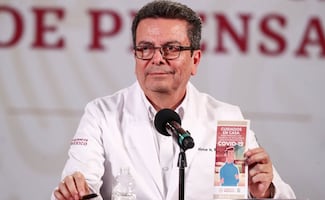Más Información

Sheinbaum pide a Segob ampliar protección a periodistas tras caso de Rafael León; "por encima de todo está la libertad de expresión"

Nombran a Miguel Hernández Velázquez inspector y contralor del Ejército, Fuerza Aérea y GN; destaca en la lucha contra el narco

Sheinbaum dice que relevo en Cofepris fue decisión de Kershenobich; Víctor Hugo Borja entró en funciones el 1 de enero

Sismo en México: Reportan daños menores en aeropuertos de CDMX y Acapulco; operaciones aéreas no tuvieron afectaciones
Pope Francis has left the Basilica of the Virgin of Guadalupe in Mexico City after celebrating Mass and spending several minutes praying privately in front of the Virgin's image.
After delivering his homily, Pope Francis sat silently in an armchair that was moved in front of the image of the Virgin of Guadalupe while the service continued in Mexico City.
He spent nearly five minutes in front of the image of Mexico's patron saint, fulfilling a wish to simply have time to pray quietly without being rushed.
Earlier in the day at the capital's cathedral, Francis told assembled bishops that "just by looking at the (Virgin), Mexico can be understood completely."
After arriving in the open-air popemobile, the visibly exhausted pontiff took his small Fiat sedan back through the chilly night air.
The Mass was his last scheduled event for Saturday and he was expected to return to the Vatican ambassador's residence for the night.
An aide apparently nudged Francis awake after he nodded off during Mass at the Basilica of the Virgin of Guadalupe in Mexico City.
The 79-year-old Francis has had an exhausting two days, coupled with a seven-hour time zone difference. He has readily admitted to snoozing while praying even when at home.
Mexico City's altitude of more than 7,000 feet provides an added challenge to those not acclimatized, perhaps especially for Francis, who lost part of one lung.
Pope Francis homily focused on the story of the Virgin revealing herself to the peasant Indian Juan Diego in 1531.
In Francis' words, "Just as she made herself present to little Juan, so too she continues to reveal herself to all of us, especially to those who feel, like him 'worthless.'"
The pope also alluded to the themes of his visit: poverty, immigration and crime.
He said, "On that morning, God aroused the hope of the little ones, of the suffering, of those displaced or rejected, of all who feel they have no worthy place in these lands. On that morning, God came close and still comes close to the suffering but resilient hearts of so many mothers, fathers, grandparents who have seen their children leaving, becoming lost or even being taken by criminals."
The basilica is home to an image of the Virgin that is said to have miraculously imprinted itself on a cloak belonging to indigenous peasant Juan Diego in 1531. The Virgin is known as the patron saint of Mexico and "empress of the Americas."
Previously, Francis demanded Mexican bishops to courageously challenge the "insidious threat" posed by the drug trade, saying the Catholic hierarchy must help Mexicans escape the violence and corruption plaguing their nation and not hide behind their own privilege and careers.
In a hard-hitting speech to a church hierarchy known for its deference to Mexico's wealthy and powerful, Francis told bishops they must be true pastors to their people and not just spew words and inoffensive denunciations like "babbling orphans beside a tomb."
Rather, he said the horrors of drug violence required "prophetic courage" from the church and a pastoral plan that involves families, parishes, schools and communities.
He said that only with such a church-inspired plan "will people finally escape the raging waters that drown so many, either victims of the drug trade or those who stand before God with their hands drenched in blood, though with pockets filled with sordid money and their consciences deadened."
The Pope also told Mexico's political leaders that they have a duty to provide their people with security, "true justice" and basic services as he plunges head-on into the topic of drug-inspired violence, corruption and social ills that afflict the country.
In a speech to President Enrique Peña Nieto and government authorities Saturday, Francis said those in public office responsible for the common good must be honest and upright and not be seduced by privilege.
He said political leaders had a "particular duty" to ensure their people had "indispensable" material and spiritual goods: "adequate housing, dignified employment, food, true justice, effective security, a healthy and peaceful environment." He said it wasn't enough just to pass laws, but for all Mexicans to take responsibility to help the country.
Francis' entire trip is shining an uncomfortable spotlight on the government's failure to solve entrenched social ills that plague many parts of Mexico - poverty, rampant gangland killings, extortion, disappearances of women, crooked cops and failed city services.
Pope Francis' address to Mexican bishops on Saturday morning included an apparent criticism of people's devotion to the so-called "Santa Muerte," or Death Saint.
"Santa Muerte" is a skeletal, cloaked female figure who carries a scythe in her bony hand. She is worshiped by drug dealers and other criminals in Mexico, but also by some downtrodden residents of the neighborhoods lorded over by the gangs.
Francis said he was "particularly concerned" by those who "praise illusions and embrace their macabre symbols to commercialize death in exchange for money."
He urged bishops "not to underestimate the moral and anti-social challenge which the drug trade represents."
An academic who has written a book on the Death Saint cults says the pope's words were "a clear allusion" to "Santa Muerte." Andrew Chesnut of Virginia Commonwealth University notes that the Catholic Church views Santa Muerte leaders as "charlatans" who use the image to turn a quick buck.
In 2013, the Vatican's culture minister called "Santa Muerte" a blasphemous symbol that shouldn't be part of any religion.
Noticias según tus intereses
[Publicidad]
[Publicidad]










